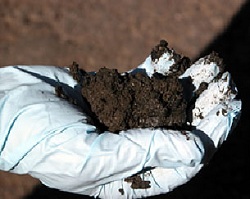 The next fields for biodiesel feedstocks could be underneath our streets.
The next fields for biodiesel feedstocks could be underneath our streets.
Environmental Protection Online reports that new research shows that municipal sludge would be a feedstock that would be nearly cost-competitive with diesel from petroleum:
Author David M. Kargbo, Ph.D., with U.S. Environmental Protection Agency Region 3’s Office of Innovation, Environmental Assessment & Innovation Division, points out that demand for biodiesel has led to the search for cost-effective biodiesel feedstocks. Soybeans, sunflower seeds and other food crops have been used as raw materials but are expensive. Sewage sludge is an attractive alternative feedstock — the United States alone produces about 7 million tons of it each year. To boost biodiesel production, sewage treatment plants could use microorganisms that produce higher amounts of oil, Kargbo said. That step alone could increase biodiesel production to the 10-billion-gallon mark, which is more than triple the nation’s current biodiesel production capacity, the report indicated.
To realize such commercial opportunities, however, stakeholders must overcome the challenges of collecting the sludge, separating biodiesel from other materials, maintaining biodiesel quality, addressing soap formation during production, and meeting regulatory concerns.
The report, appearing in the latest version of the bimonthly journal Energy & Fuels, says biodiesel from sludge “could be very profitable in the long run.”

